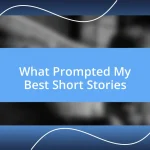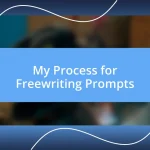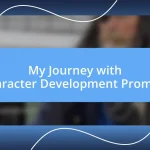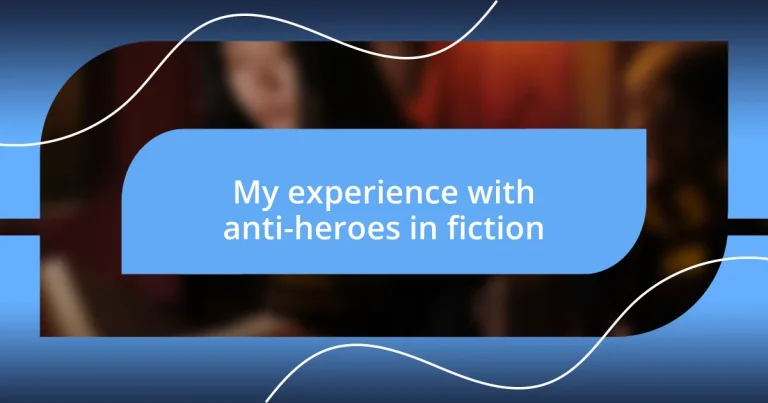Key takeaways:
- Anti-heroes reflect complex human emotions, challenging our perceptions of morality and heroism through their relatable flaws and motivations.
- Iconic anti-heroes like Walter White and Deadpool resonate with audiences by showcasing their moral ambiguities, making viewers contemplate their own internal struggles.
- Engagement with anti-hero narratives offers insights into self-reflection, acceptance of imperfections, and resilience in the face of adversity.
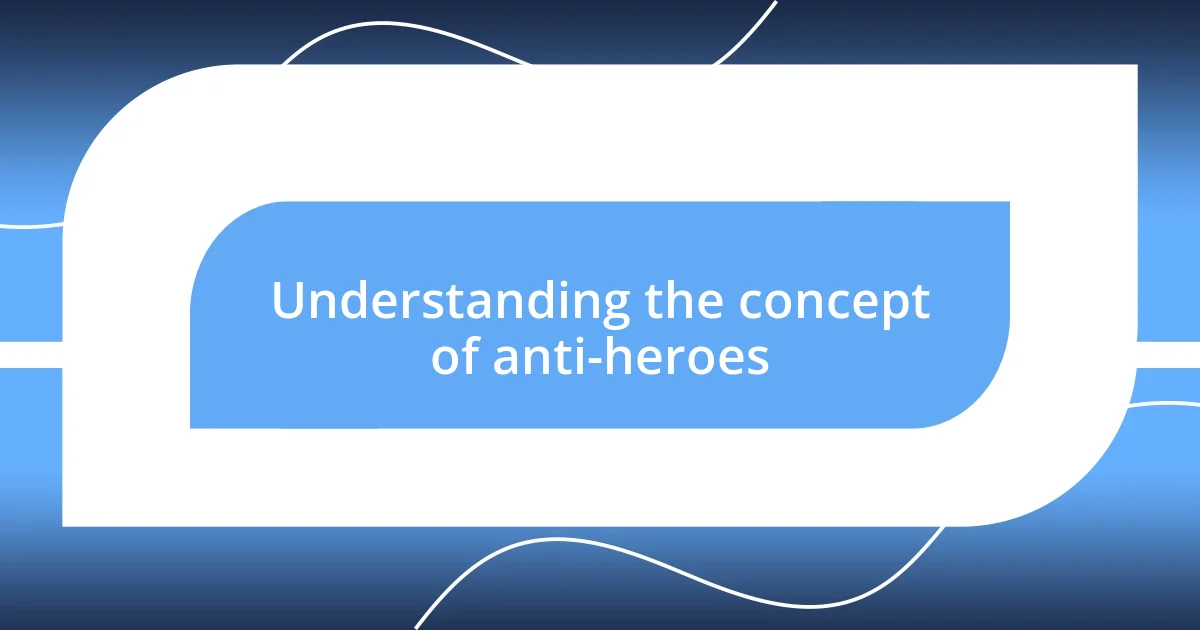
Understanding the concept of anti-heroes
When I first encountered the term “anti-hero,” I was intrigued. These characters often blur the line between good and evil, navigating a moral gray area that feels all too relatable. Have you ever found yourself rooting for someone who’s not entirely virtuous? It’s a feeling I’ve experienced countless times, whether in the pages of a novel or on screen.
Anti-heroes often resonate with audiences because they reflect our own complexities. They grapple with flaws and inconsistencies that mirror real-life struggles, making them more human than traditional heroes. For instance, I can recall being drawn to a character who—despite their selfish tendencies—displays moments of vulnerability that strike a chord. Isn’t it fascinating how we can identify with someone who makes questionable choices yet still find layers of depth beneath their façade?
Moreover, anti-heroes challenge our perceptions of morality. When I watch or read about these characters, I can’t help but question what truly defines a hero. Are they the ones who follow the rules, or can they also be the rebels who push boundaries for a greater cause? This complex interplay of motives and consequences adds a rich dimension to storytelling that keeps me engaged and reflective long after the story ends.
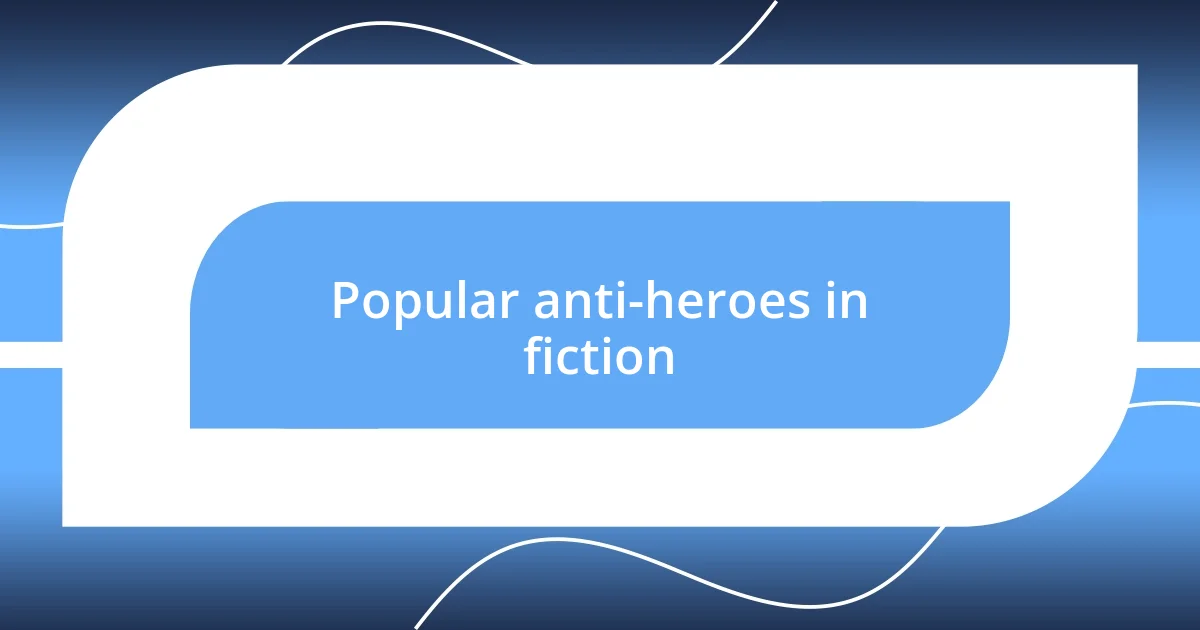
Popular anti-heroes in fiction
Popular anti-heroes often captivate us with their multifaceted personalities. Characters like Walter White from “Breaking Bad” showcase a transformation that draws viewers in with each morally questionable choice. I remember binging the series, feeling my stomach twist as I found myself rooting for him, despite the consequences of his actions. It’s that struggle between right and wrong that makes these characters so compelling.
Here’s a brief list of iconic anti-heroes that have left a mark in fiction:
- Deadpool – The irreverent mercenary known for his humor and complete disregard for rules.
- Tony Stark/Iron Man – A genius billionaire with a flawed personality who evolves into a reluctant hero.
- Dexter Morgan – The forensic analyst who secretly plays vigilante, targeting other criminals.
- Holden Caulfield from “The Catcher in the Rye” – A disenchanted teenager battling societal norms and personal demons.
- Loki – The God of Mischief who oscillates between villainy and redemption across the Marvel Universe.
When I think of these characters, I can’t help but feel a sense of empathy. I often reflect on how they mirror our own imperfections and desires for validation. Their struggles resonate deeply, reminding me that heroism isn’t just about noble acts but also the messy, chaotic reality of being human.
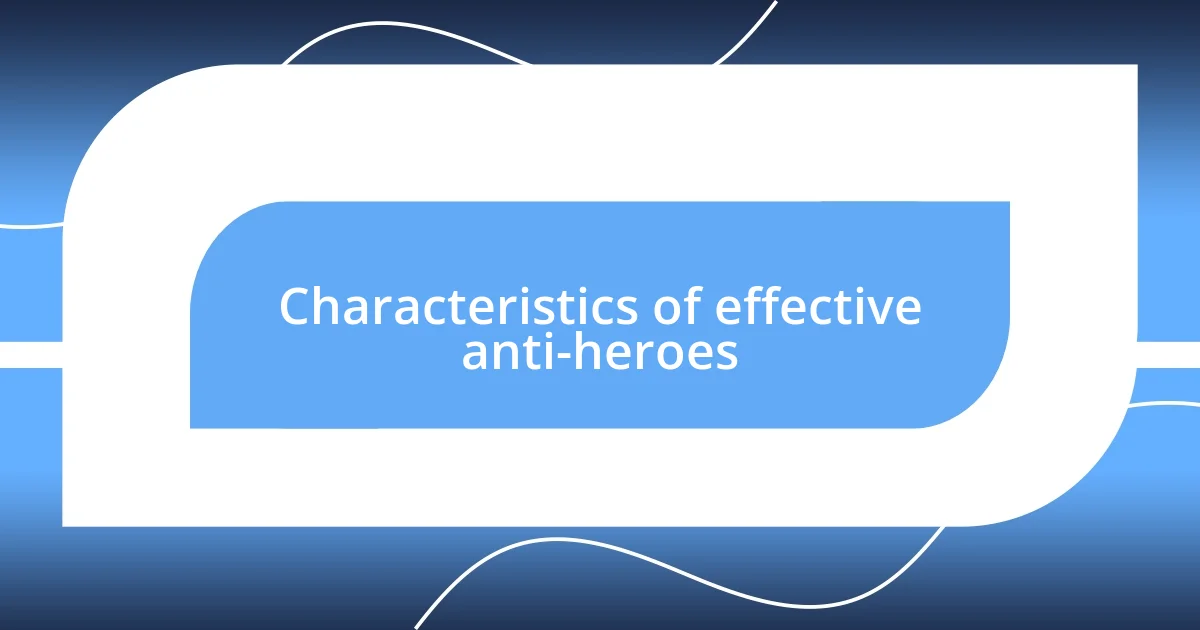
Characteristics of effective anti-heroes
Effective anti-heroes are marked by their complexity and relatability. They embody a mix of admirable qualities and glaring flaws that make them much more than one-dimensional characters. For instance, I can recall feeling a strong connection to a character who, despite their moral ambiguities, displayed unwavering loyalty to their loved ones. This duality can make me ponder—can flawed traits actually enhance our admiration for these characters?
Their motivations often stem from a deep-seated dissatisfaction with societal norms, which adds layers to their persona. A perfect example would be a character who breaks the law not for personal gain, but to expose systemic injustices. I remember feeling a mix of exhilaration and apprehension as I watched them challenge the status quo, which made me rethink my own views on authority and rebellion. It’s fascinating how these internal struggles can resonate with our own life battles, don’t you think?
Another key characteristic of effective anti-heroes is their capacity for growth. Through their journeys, they often confront their own demons, leading to moments of genuine self-reflection. I have encountered stories where the character’s evolution becomes a pivotal aspect of the narrative. Their journey of self-discovery is not only compelling but also encourages me to reflect on my own path. Is it possible that our own missteps can guide us toward a greater understanding of ourselves?
| Characteristic | Description |
|---|---|
| Complexity | Anti-heroes embody both admirable traits and significant flaws, creating a relatable and multifaceted personality. |
| Motivation | They often act upon deeply personal grievances, challenging societal norms and sparking critical reflection within the audience. |
| Growth | Through their journeys, they undergo transformation and self-discovery, allowing audiences to connect with their evolution. |
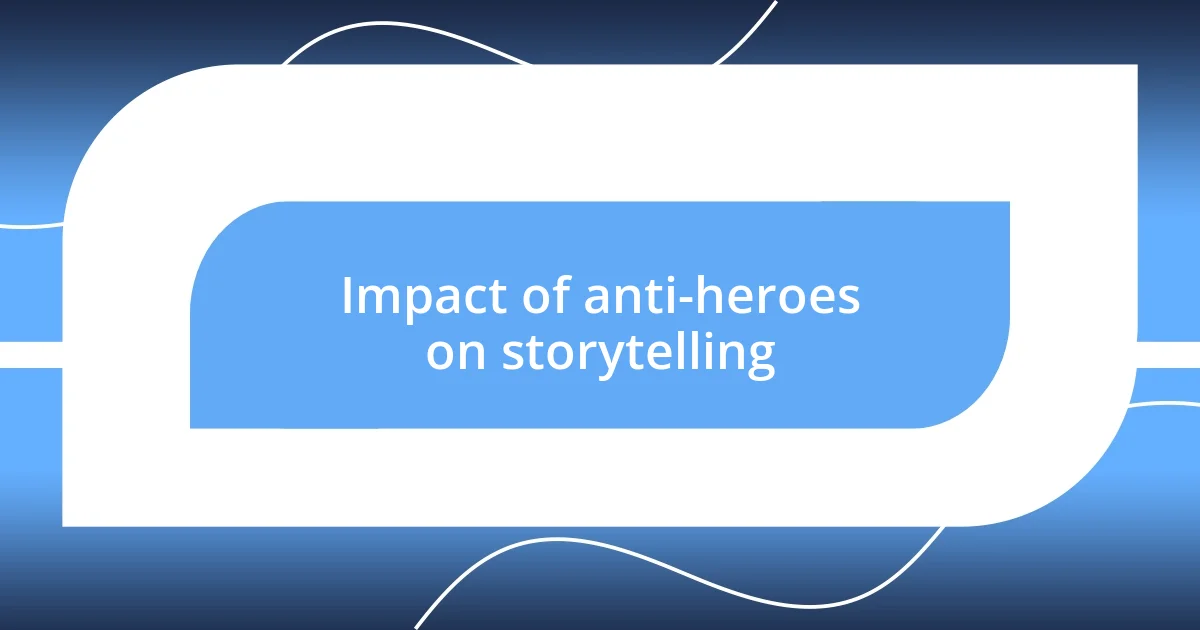
Impact of anti-heroes on storytelling
The presence of anti-heroes in storytelling transforms traditional narrative arcs, often blurring the lines between good and evil. I’ve found that this ambiguity draws me into the story in a uniquely profound way, as I’m constantly questioning the motives behind a character’s decisions. It makes me wonder—can a character be both a villain and a hero simultaneously?
These complex characters often lead us to explore darker themes that might otherwise remain unexamined. For example, during a gripping scene with Holden Caulfield, I felt a deep sadness as he grapples with his alienation. It pushed me to reflect on my own experiences with disconnection. I believe stories like these encourage readers to acknowledge their vulnerabilities and embrace the idea that imperfection is a part of the human experience.
Moreover, anti-heroes often serve as mirrors for our own moral struggles. I remember an intense moment in “Breaking Bad” where Walter White crossed another line, and I felt a mix of exhilaration and dread. How could I root for someone so morally bankrupt? This tension made me realize that we all harbor a little darkness within us. Ultimately, the impact of anti-heroes is not just in the stories they tell but in the deeper conversations they spark within us about morality and choice.
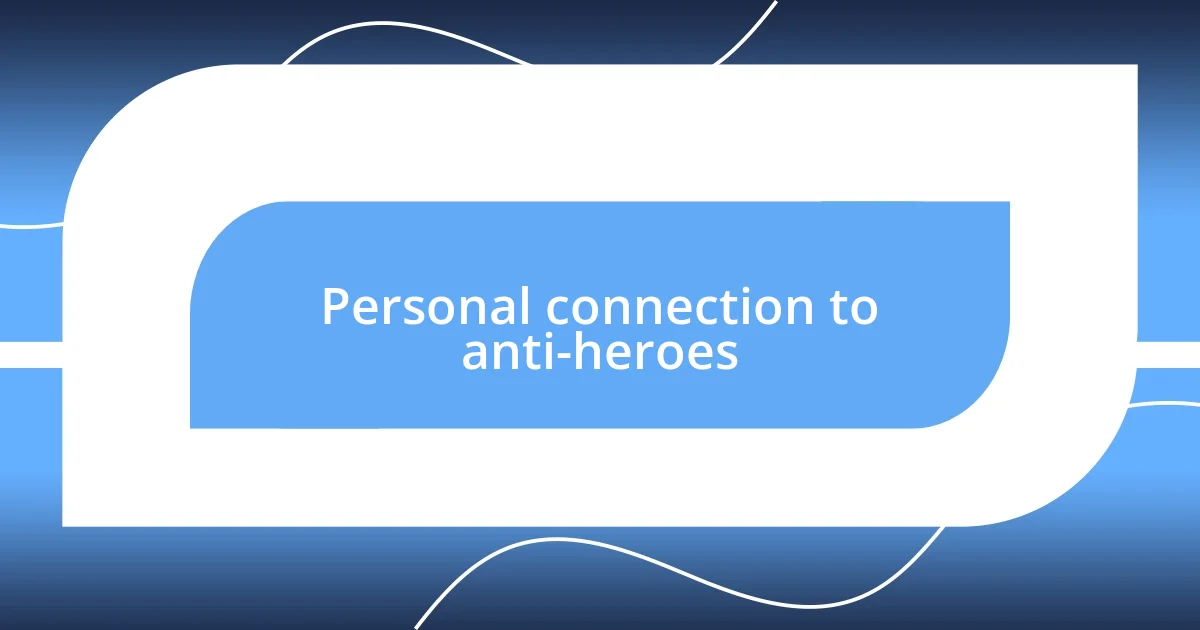
Personal connection to anti-heroes
It’s fascinating how I’ve often found pieces of myself reflected in anti-heroes. For instance, when I first encountered a character who grapples with their past decisions while trying to do the right thing, I couldn’t help but identify with that struggle. It reminded me of times in my life when I felt torn between what I was supposed to do and what I genuinely wanted, creating a strong emotional connection that stayed with me long after the story ended.
I remember vividly a time when I was engrossed in a graphic novel about an anti-hero who drained every ounce of loyalty from their friends and family. I was at a coffee shop, and I felt an overwhelming rush of empathy for this character, despite their flawed nature. It made me reflect on personal relationships in my life; could my flaws also drive others away? Moments like these where fiction mirrors our reality can evoke profound insights about our own lives.
Sometimes, I catch myself wondering if embracing the darkness within us is a form of liberation. I recall feeling a mix of excitement and fear while reading a series where the anti-hero consistently makes morally gray decisions. This led me to ask—does confronting our darker side allow us to appreciate the light more? These characters encourage me not only to question right and wrong but also to embrace the complexities that define us as individuals.
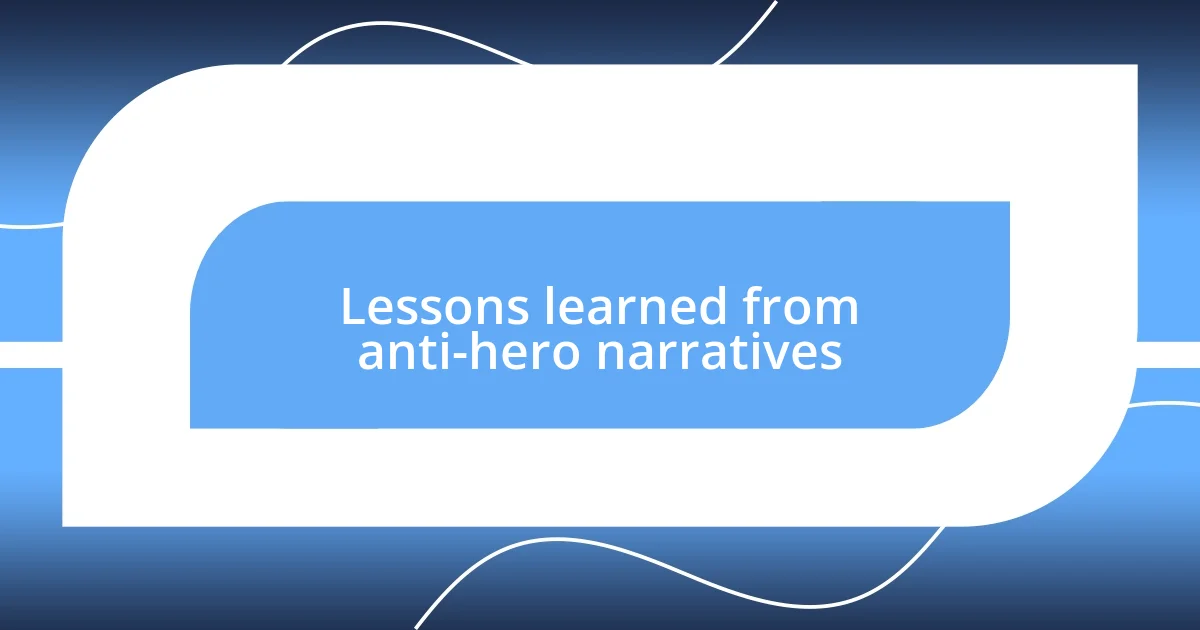
Lessons learned from anti-hero narratives
Everyone can glean valuable insights from anti-hero narratives. One key lesson I’ve learned is about self-reflection. There was a time when I engaged with a story centered on an anti-hero who kept making selfish choices. It struck me how easily we can slip into prioritizing our desires over the well-being of others. That realization prompted me to consider my own actions—am I sometimes more concerned with my needs than those around me?
Another important lesson is about acceptance. Characters like Deadpool embody a messy blend of humor, chaos, and vulnerability, which resonates deeply with me. I recall laughing out loud at his absurd antics, only to realize that he reflects my own quirks and imperfections. This narrative encouraged me to embrace my flaws and understand that being imperfect is what makes us relatable.
Lastly, I’ve discovered that anti-heroes can inspire resilience. I think about the journey of a flawed protagonist who continually faces failure yet rises each time. Watching that character battle through adversity made me reflect on my own struggles. It’s invigorating to think that embracing our setbacks can lead to growth. Isn’t it fascinating how these complicated narratives can motivate us to embrace the trials of our own lives?



